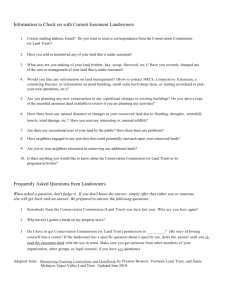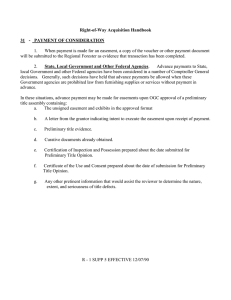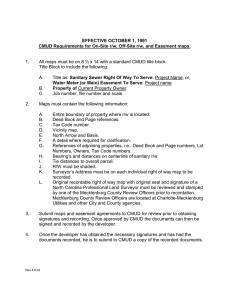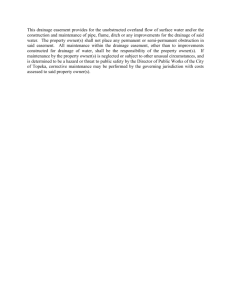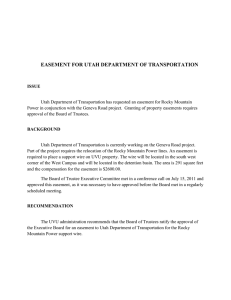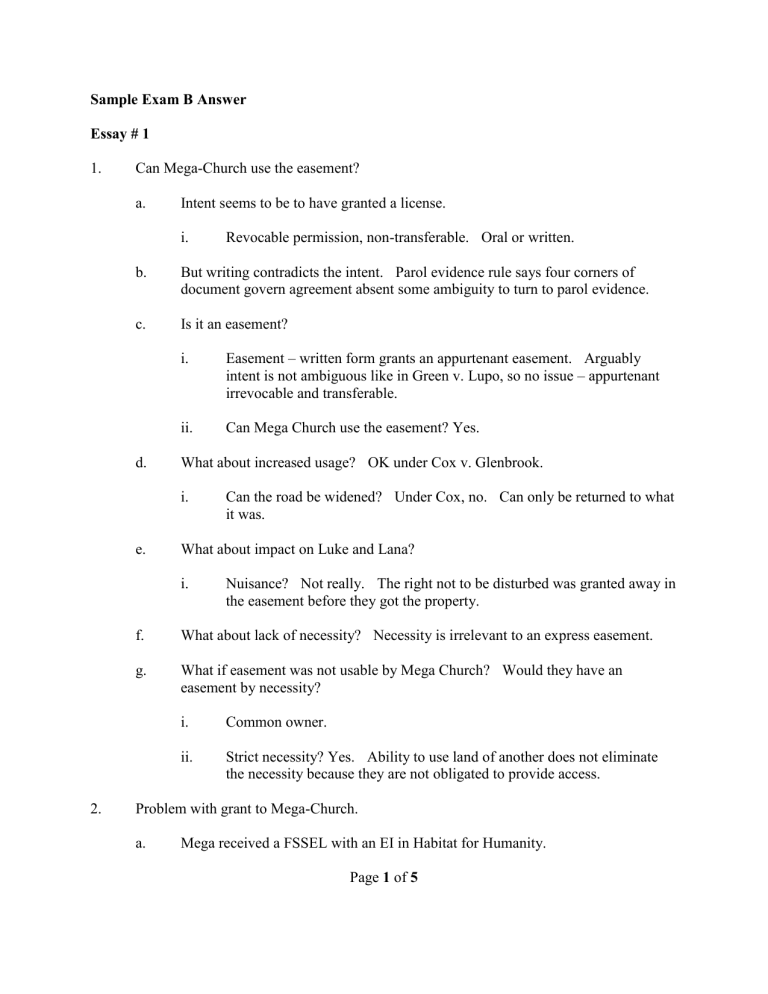
Sample Exam B Answer Essay # 1 1. Can Mega-Church use the easement? a. Intent seems to be to have granted a license. i. b. But writing contradicts the intent. Parol evidence rule says four corners of document govern agreement absent some ambiguity to turn to parol evidence. c. Is it an easement? d. i. Easement – written form grants an appurtenant easement. Arguably intent is not ambiguous like in Green v. Lupo, so no issue – appurtenant irrevocable and transferable. ii. Can Mega Church use the easement? Yes. What about increased usage? OK under Cox v. Glenbrook. i. e. Can the road be widened? Under Cox, no. Can only be returned to what it was. What about impact on Luke and Lana? i. 2. Revocable permission, non-transferable. Oral or written. Nuisance? Not really. The right not to be disturbed was granted away in the easement before they got the property. f. What about lack of necessity? Necessity is irrelevant to an express easement. g. What if easement was not usable by Mega Church? Would they have an easement by necessity? i. Common owner. ii. Strict necessity? Yes. Ability to use land of another does not eliminate the necessity because they are not obligated to provide access. Problem with grant to Mega-Church. a. Mega received a FSSEL with an EI in Habitat for Humanity. Page 1 of 5 i. b. 3. RAP does not apply because a charitable institution – charity to charity exception. This grant violates public accommodations anti-discrimination laws because it denies entry based on religion. Impact of conveyance to Murray. a. b. Identify recording Act – Even though Murray recorded second, he is a subsequent purchaser for value so Mega is not protected if there was no consideration. Essay #2 1. How do Telly and Uri hold the property? a. 2. Not T by E because unmarried at the time of conveyance. i. 5th unity is unmet. ii. Had it been T by E, neither party could have unilaterally conveyed. Subsequent marriage is insufficient. b. TC? Default co-tenancy. Each may convey or leave to their heirs. c. JT? A court might interpret as a JT because they sought to at least have the benefit of the right of survivorship. Ozzie who conveyed the property to Telly and Uri by properly executed Quitclaim deed as follows: “To Telly and Uri and their heirs in fee simple absolute, the day after the wedding, as Tenants by the Entirety.” a. 3. The conveyance the day after the wedding which never took place. Ozzie has a FSSEL and Terri and Uri have a springing EI. Subject to RAP and doesn’t violate. Vince’s No Show at Closing. a. Assuming Telly and Uri were able to convey marketable title, Vince would be in breach of the purchase and sale agreement. i. Remedies. (1) Specific performance. Purchase price in exchange for transfer. (2) Damages. Contract price minus market price. Page 2 of 5 b. Were Telly and Uri prepared to convey marketable title to Vince? i. Impact of sister’s lease. (1) (2) (3) If they had a T by E, the conveyance would have been ineffective. If they had a T in C, Tia would have had the right to possess an undivided ½ of the parcel for the duration of her life. (a) Uri would have had a reversion and the future right to possess an undivided ½. (b) Upon Telly, death, Tia and Telly’ heir would hold as T in Cs together. If they had a JT, Tia would have had the right to possess an undivided ½ of the parcel for the duration of her life and Uri would have had a reversion. (a) Would the conveyance of a life estate sever the JT? (i) Yes – MD approach. A lease severs so a life estate should sever. (ii) No – Tenhet approach. A lease does not sever so a life estate would not sever. 1) (4) Upon Telly’ death, what would happen to the life estate? a) Extinguish as in Tenhet? Logical conclusion if we decide that it does not sever. b) Remain in effect? Seemingly inconsistent with a right of survivorship. Marketable title -- Title free from reasonable doubt. (a) Either encumbrances or chain of title defects. (i) Tia’s life estate would be an encumbrance – property interest in a person other than the grantor Page 3 of 5 that affects the value or usability of the property. Tia’s life estate is a conflicting title. ii. Greenhouse and mis-description of the property lines. (1) iii. Greenhouse is entirely on neighbor’s property. (a) Traditionally, this would be a fixture annexed to neighbor’s property and would belong to neighbor. (b) Under relative hardship, a court would assess the nature of the mistake and the enrichment to the Neighbor. (i) Both were mistaken. (ii) Should the neighbor be estopped because he stood by and watched the construction? (2) Since Vince’s bargain included the greenhouse, the doubt with respect to the ownership of the greenhouse would represent a chain of title defect that would make title unmarketable. (3) The incorrect property description would also make title unmarketable. Flood in Basement. (1) Absent an explicit agreement to the contrary, Vince would be on the hook for the loss in the basement. Common law provides that the buyer has equitable title to the property and bears the risk of loss. Seller has legal title. (a) (2) Today, this risk of loss is typically placed on the seller by contractual agreement. No such agreement here. Misrepresentation and fraudulent suppression. The only way that Vince would be excused from the conditions in the basement is if Telly and Uri misrepresented the condition in the basement or fraudulently suppressed a defect in the basement. (a) An affirmative statement that is known to be false and concerns a material fact and is reasonably relied upon by the buyer in deciding to purchase and causes damage as a proximate result. Page 4 of 5 (b) (3) Active concealment of a material fact that the seller is under an obligation to reveal so as to prevent the other party from discovering the fact. Nondisclosure (a) Today courts like Johnson v. Davis require disclosure of facts that are not readily observable and materially affect the value of the property. (i) (b) Since this is a traditional jurisdiction we need some justification for changing the common law rule. Arguably the water problem in the basement was a readily observable defect. (i) In Puget Sound (p. 932) a seller was liable for water leakage damage where they had failed to reveal how serious the problem was. Here the facts suggest a one time occurrence. Page 5 of 5
